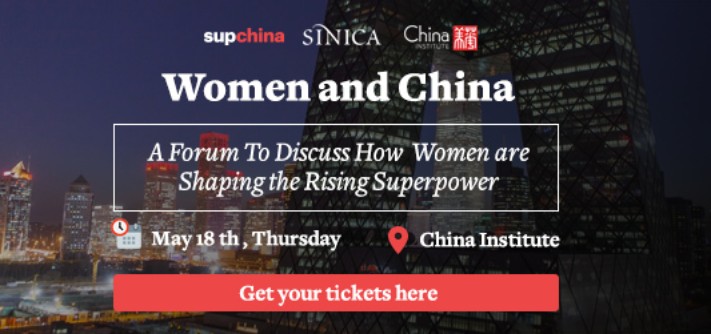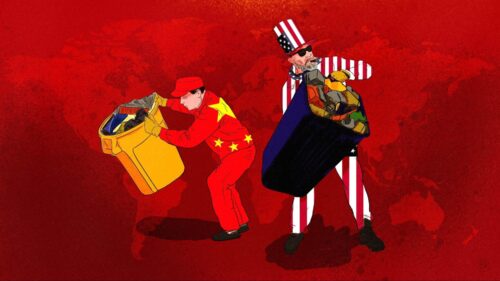Chinese state media asks: Is there nepotism in the White House?
Top China news for April 4, 2017. Get this daily digest delivered to your inbox by signing up at supchina.com/subscribe.

State media on Kushner and nepotism in the White House
The Paper, a lively state-owned website, has published an article based on a Washington Post story about Jared Kushner’s “singular and almost untouchable role in Trump’s White House” and his recent trip to Iraq. The article echoes the Post’s comments that Kushner is “a key conduit of influence to his mercurial father-in-law” and that he has already become a “shadow secretary of state.” Meanwhile, the state broadcaster CCTV aired a segment on whether Kushner’s White House role is illegal under the 1967 anti-nepotism law, but points out that a federal judge has previously ruled that the law does not apply to White House staff jobs.
You can watch the TV segment and read the article on QQ News (in Chinese).
In Helsinki, Xi signals support for EU and free trade
President Xi Jinping is making a rather pointed state visit to Finland before his meeting with Donald Trump on April 6 and 7 in Florida. Bloomberg reports that President Xi has been “greeted with open arms” in Helsinki. Before his visit, Xi published an article in the Helsinki Times praising European integration and signaled China’s willingness to support the EU as it goes forward with Brexit, contrasting with Trump’s calls to break up the EU. Finland, receiving its first Chinese presidential visit since 1995, and Norway, with a presidential delegation en route to Beijing this Friday for the first time in a decade, are among the European countries that are most opposed to protectionism. Commenting on Xi’s visit, Olli Rehn, a Bank of Finland board member, said, “We may not share all the values, but we share the goal of free trade.”
On a related matter, today on The China Project we publish a piece by Cheng Li of the Brookings Institute: “The Trump-Xi summit: Why personal relationships matter.”
The sweeping of the graves
Today is Qingming, or Tomb-Sweeping Day: a festival when people honor their ancestors by cleaning their graves, and burning “spirit money” and paper replicas of loved ones’ favorite objects such as cars and phones. Last week, The China Project published an article on the shortage of graves in Chinese cities and government efforts to convince people that cremation is a better choice than burial.
This issue of the The China Project newsletter was produced by Sky Canaves, Lucas Niewenhuis, Jia Guo, and Jiayun Feng. More China stories worth your time are curated below, with the most important ones at the top of each section.
BUSINESS AND TECHNOLOGY:
As South Korean companies suffer in China, politicians fight back
Anti-Korean sentiment in China continues to run high, and South Korean politicians are becoming increasingly vocal in condemning China’s unofficial boycotts of imports from their country. Last week, the South Korean ambassador to China distributed a letter to multiple ministries in Beijing calling for an end to retaliation against the South Korean company Lotte — see this Wall Street Journal report (paywall) for details. Furthermore, all but one of 189 South Korean lawmakers in attendance at a national legislative meeting voted for a resolution denouncing Chinese restrictions on tourism and regulations against South Korea.
Adding to South Korea’s China woes, sources told Reuters that both Kia and Hyundai had recently cut shifts in their production plants in China. It is a response to what one source claimed was a combined 52 percent sales slump in China for the companies in March relative to a year ago.
- Xi’s crackdown on corruption is a boon to corporate China / Financial Times (paywall)
- China’s ‘bad banks’ thrive as alternative lenders / Financial Times (paywall)
- A key path to plum finance jobs in China is being closed off as banks get more automated / Quartz
- Warren Buffett’s face will adorn cans of Cherry Coke in China / Bloomberg
POLITICS AND CURRENT AFFAIRS:
Neo-Maoists root for Trump
The New York Times reports (paywall) that a small but vocal minority in China that advocates strong nationalism and a rejection of Western liberal democracy is lauding Donald Trump for tearing up “the old rules of the ruling elites, not just of the capitalist West,” and for being alone among national leaders daring “to openly promote the political ideas of Chairman Mao.” The loosely organized coalition is sometimes called “neo-Maoist” for its nostalgia for Mao-era China and its support of the Chairman’s ideas.
The scholar Jude Blanchette, who is writing a book on the movement, told the Times, “Many of the same ideas now animating the global populist movement have been the hallmarks of the neo-Maoist movement for over a decade,” and the Times notes that neo-Maoist periodicals have recently praised Trump for similarities between his rhetoric and that of Mao Zedong.
For more on the neo-Maoist movement, listen to the Sinica Podcast interview with Blanchette, and there is more on Trump-supporting Chinese people in a Sinica episode with Jiayang Fan.
- India-China dispute deepens over Dalai Lama’s India trip / AP
- China’s media foothold expands to the Gulf / The Diplomat
- Why one writer is fighting to call China’s Communist Party to account for its wrongdoings – Zhang Yihe 章诒和 pushes for the “eradication of Mao’s ideology” / SCMP
- Hong Kong’s restive youth prepare for long struggle with Beijing / Reuters
SOCIETY AND CULTURE:
China calls for whole population to speak Mandarin
China’s Ministry of Education and its National Language Committee have issued an announcement (in Chinese) calling for intensive work to spread the use of spoken Mandarin and standardized Chinese characters. Currently, about 70 percent of the population can speak Mandarin. In big cities, the figure is around 90 percent, but according to the announcement in some rural areas and among ethnic groups, the number is 40 percent or even lower. The BBC has a short report on the announcement that says the target is to have 80 percent of the population speaking Mandarin by 2020, but the original announcement does not actually mention that number.
The Ministry of Education says that ensuring that the use of Mandarin is thoroughly popularized is an important goal of the 13th five-year plan, and necessary to meet China’s development goals and to preserve social harmony and unity of the nation. The announcement also calls for the “scientific preservation” (科学保护 kēxué bǎohù) of the languages of ethnic minorities.
- It’s not Communism holding China’s youth back. It’s their parents / Foreign Policy (paywall)
- Mutations may reveal how Tibetans can live on world’s highest plateau / Science
- Chinese man ‘marries’ robot he built himself / The Guardian
- Burton Watson, 1925–2017 / Xichuan Poetry






